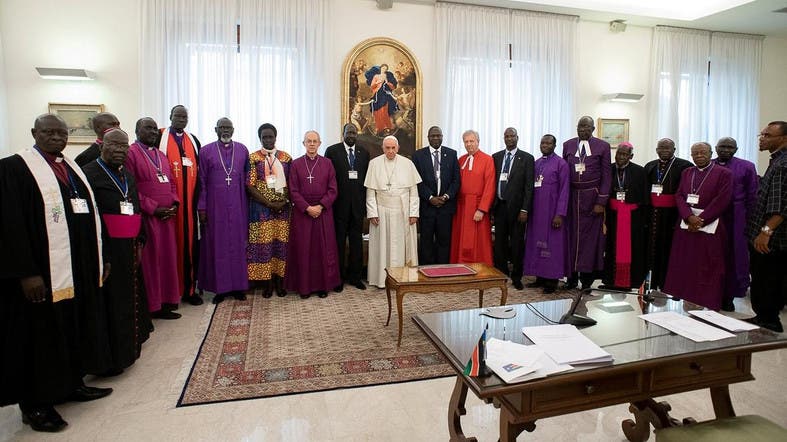Pope Francis kissed the feet of warring South Sudanese leaders at the Vatican on Thursday shocking thousands of people around the world.

In what has been described as an unusual appeal for peace through an even more unusual approach, Pope Francis took time to kiss the feet of South Sudanese President Salva Kiir and four of the nation’s five designated vice presidents: Riek Machar, James Wani Igga, Taban Deng Gai and Rebecca Nyandeng De Mabior as a way of appealing to them to maintain peace and be fathers of the nation, protect the people and desist from war.

The peace appeal was the highlight of a two-day spiritual retreat the leaders held in Rome at the Domus Sanctae Marthae, the Vatican guesthouse where the Pope lives. The aim of the spiritual retreat was to foster togetherness among the leaders which would have an effect on the nation as they prepare to share powers as stated in a peace agreement signed in September that brought an end to the war.
The idea of the Anglican Archbishop Justin Welby of Canterbury, spiritual leader of the Anglican Communion who was also present, the retreat was held to prevent the repeat of the 2013 clashes between President Salva Kiir and former rebel leader Riek Machar that led to the loss of over 400,000 lives in the civil war that ensued.
The videos show the warring leaders in complete awe as the Pope gets on his knees to kiss their feet while they beg him to stand up. After the gesture, the BBC reports that the Pope said “I am asking you as a brother to stay in peace. I am asking you with my heart, let us go forward.”
Continuing his speech, the Pope went on to say: “Peace is the first gift that the Lord brought us, and the first commitment that leaders of nations must pursue… Peace is the fundamental condition for ensuring the rights of each individual and the integral development of an entire nation… Peace is possible with a spirit that is noble, upright, strong and courageous to build peace through dialogue, negotiation and forgiveness… We stand before the gaze of the Lord, who is able to see the truth in us and to lead us fully to that truth.”
“We may well have made mistakes, some rather small, others much greater, but Jesus always is ready to forgive those who repent and return to serving their people… Dear brothers and sisters, Jesus is also gazing, here and now, upon each one of us. He looks at us with love, he asks something, he forgives something, and he gives us a mission. He has put great trust in us by choosing us to be his co-workers in the creation of a more just world,” he added.
In his last words to the South Sudanese leaders, Pope Francis said: “By your gift, Father, may the whole-hearted search for peace resolve disputes, may
History of South Sudan’s woes
South Sudan is the world’s youngest country since it gained its independence seven years ago from neighbouring Sudan on July 9, 2011, after a 2005 agreement to end the longest-running civil war that started since 1962.
The independence of the black South Sudanese indigenes indeed ended the civil war with the Arab Sudanese overlords, but started another inter-ethnic and inter-factional civil war based on greed and paranoia among the black Africans.
Oil-rich South Sudan is the only country where rebels are leading the state with the cowboy hat wearing president Salva Kiir leading the Sudan People’s Liberation Movement (SPLM) faction while his Vice President Riek Machar – whom he had fired twice – leads the Sudan People’s Liberation Movement – In Opposition (SPLM-IO) rival faction.
They fought primarily along ethnic lines between Kiir’s Dinka and Machar’s Nuer tribal groups. These two armed rebel groups have caused the displacement of over 4 million citizens since independence and caused the death of over a million as they fought each other since 2013 using kidnapped children to fight their battles.
The powerful rebel groups were not dissolved after they successfully fought for independence, they rather gained more authority with impunity as out-of-control soldiers boldly raped women, raided communities and recruited child soldiers to stay formidable.
The 2013 resumption of the civil war followed accusations by Salva Kiir that his Vice President Riek Machar was plotting to overthrow him. He dissolved the cabinet, sacked Machar and another deadly war erupted. The factions targeted oil-mining communities and killed civilians.
There were many unsuccessful ceasefire agreements brokered by Uganda and Ethiopia while the fighting continued until 2016 when the Vice President was reinstated briefly between April and July.

Machar went back into exile and the fighting intensified as over a million civilians entered into Uganda while foreign missions and companies exited the country. This caused a strain on the government as the economy collapsed and famine ravaged the country.
Some hope was restored in 2017 after the government declared a unilateral ceasefire and launched a national dialogue inclusive of the rival rebel factions in the country. Riek Machar, who was in self-exile in South Africa, refused to be a part of the dialogue after delegations were sent to him.
Kiir and Machar agreed again in 2018 for a third time to a power-sharing deal that will ensure the reinstatement of Riek Machar as a Vice President and his return to the capital of Juba.
The two signed the deal in August in the presence of former Sudanese President Omar al-Bashir and his counterparts from Kenya, Uganda and Djibouti, along with foreign diplomats.
As per the deal, the two have formed a transitional government with five vice presidents expected to be in power for three years.










